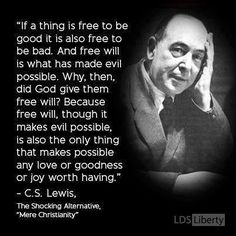The term “free will” is highly problematic, for in reality, there is no such thing as a “free will.” All our so-called “free choices” are not only influenced by our mental, emotional, and physical state of being, but also by our genetics, the environment in which we live, the situation in which we find ourselves, the relationships in our lives, and even by things like how much sleep we got last night and what we ate for lunch. “Freedom is not the absence of influences” (Vance, The Other Side of Calvinism, 202).

Even God, I would argue, does not have a completely “free” will, for He too is influenced by the Trinitarian Godhead, by His creation, by His goal to glorify Himself, and by His own character. Though God is the most free being, even His will is not completely free to do anything.
For example, He cannot sin, as this would be contrary to His nature. Nor can He do that which is logically impossible, such as make a round square or create a rock too heavy to lift. Also, God cannot break the rules He has set up for Himself regarding the governance of His creation. For example, if He has given humans the freedom to make choices, He cannot stop them from choosing things He does not like.
So rather than “free will,” it might be best to talk about “true will.”
That is, can a person make genuine decisions, or are all decisions subject to something like fate or divine predetermination? We will talk more about predetermination and foreordination in the future posts about Unconditional Election and the Sovereignty of God, so I don’t want to use a lot of room to discuss these issues here, except to say that Scripture, reason, and experience all seem to point pretty clearly to the fact that God expects us to make wise choices and holds us accountable for the choices and decisions we make.
If our decisions were fated or predetermined by God, then God could no more hold us accountable for the decisions we make than we could hold accountable a wind-up toy car for driving off a table if we are the ones who wound it up, put it on the table, and sent it driving off toward the edge. Or to use a more complex example, though most modern people have had the experience of yelling at our computers in frustration for what they do, we all know that the fault is never with the computer, for it is simply doing what we (or some computer programmer) have told it to do.
Sin is Evidence of Free Will
 I would argue further that sin is the greatest proof for the existence of human true will (or free will, if you prefer that term). Why?
I would argue further that sin is the greatest proof for the existence of human true will (or free will, if you prefer that term). Why?
To begin with, given the facts that God has a will and that sin exists, we are only left with a few options as the origin of sin and evil: We must say either that God willed sin into existence or He did not.
We will see later in the discussion on the Sovereignty of God that Calvinists are divided on this issue. Most Christians, however, agree that God did not will sin into existence. And if He did not will sin into existence, then it had to have come from some other will—a will outside of God’s will.
Sin cannot have come from God’s will, for sin is contrary to and opposed to God’s will.
Therefore, sin must have its origination in a will that is separate from God, or else God would be divided against Himself. Since all people sin, the will of an individual person must be one such will that is separate from God. Curiously then, the sinfulness of mankind does not disprove the existence of the will of man, but proves it!
Self-caused actions founded in the wills of men are the best explanation for the origin of evil.
If, therefore, self-caused actions help account for the origin of evil, then the origin of evil helps prove the existence and reality of self-caused actions. In other words, if there is no true will, we would have no way to explain the origin of evil unless it were attributed to God.
But since evil cannot have its origin in God, the origin of evil must be explained through the real decisions of God’s creatures. He created beings with true wills, knowing that they might misuse and abuse this amazing gift for the purpose of rebellion, but also knowing that without such a gift, there could be no way for Him to receive the goal and purpose of a true will, namely, true love. God knew that without a true will there could be no true love; and God, desiring to have loving relationships with His creation, decided that the gift of a true will to His creatures was worth the risk.
What Happened to Free Will when Sin Entered the World?
When Adam and Eve misused their wills in the Garden of Eden by eating fruit from the tree of the knowledge of good and evil, sin entered into the world, and with it came death, decay, and destruction. Earlier in this chapter, in the discussion on Romans 7:15-20, we saw that when Adam and Eve sinned, they died spiritually and sin corrupted their body, which also began to die.
But what about the soul? Was it corrupted by sin? Did the soul also begin to die?
Scripture seems to indicate that the death which affected the bodies and spirits of people, does not affect the soul in the same way. We cannot speak of soulish death the same way we can speak of physical or spiritual death. The reason is because the soul is the “life” of a person. It is the breath of life, the animating principle of a human being (cf. Gen 2:7). To speak of soul death would be to speak of life death, which makes no sense.
Though the Bible occasionally speaks of the death of the soul (cf. Ezek 18:4; Matt 16:25-26; Jas 1:21; 5:20; 1 Pet 1:9) these texts do not refer to the death of the soul itself, but to the separation of the body from the soul, which results in physical death (see the following articles by Bob Wilkin: “Soul Talk, Soul Food, and Soul Salvation”; “Saving the Soul of a Fellow Christian (James 5:29-20)”; “Saving Your Soul By Doing Good (James 1:21)”; “Gaining by Losing (Matthew 16:24-28)”; “Suffering which results in Abundant Life (1 Peter 1:9)”).
When there is no “life” (soul) in the body, the body is dead. Though the soul can live without the body, the body cannot live without the soul.
All this is to say that the faculties of the soul, which include imagination, memory, reason, and emotions, were not themselves damaged by sin. Certainly, since these faculties of the soul are dependent upon the health of the physical brain, and the brain is dying as a result of being part of the physical body, our imagination, memory, reason, and emotions are not used to their full capabilities.
Nevertheless, the soul is able to utilize its capacity to imagine, create, remember, reason, and feel emotions. The will, being an interplay of all of these soulish capacities, is therefore also able to function. It interesting that those who teach the inability of the human will to function almost never teach the inability to function of the imagination, memory, reason, and emotions. Just as these are able to function, so also is the will.
Scripture Calls People to Exercize their Free Will
Therefore, it is no surprise that Scripture contains frequent calls for people to exercise their wills in the practice of obedience and righteousness.
From the very beginning with Cain, God wanted him to turn from His sin so that He might escape the disastrous consequences of it (Gen 4:7). Through the periods of Abraham, Isaac, Jacob, and the Twelve Patriarchs, and into to the days of Moses and the Judges, and into the times of the Kings and the Prophets, God constantly and unceasingly calls on all people to turn from their wicked ways and follow Him (Deut 30:19-20a; Josh 24:15; 1 Kings 18:21; Isa 1:18-19; etc.). Even Jesus, during His ministry, constantly pled with people to leave their sin and follow Him (John 5:39-40; 7:17, 37-38; Matt 11:2-8; 22:3; 23:37-38). The preaching of Peter, Paul, and the other apostles all contained the same message. Even the ongoing work of the Holy Spirit is to convict the world of sin, righteousness, and judgment (John 16:8-11).
Yet note that although the practice of obedience and righteousness is called for in Scripture, this in no way means that such practices result in eternal life.
Even if someone was as good as Mother Theresa or Gandhi, they could not earn their eternal life by their good works any more than could Hitler or Pol Pot by their evil works. I point out the biblical call for people to respond to God, not to say that people can contribute to the reception of eternal life, but only to show that if God expects people to hear His truth and respond, who are we to teach that they cannot do so?
Furthermore, if humans do not have free will and are unable to respond to the call of God, then all the calls of God in Scripture are little more than farcical games in which God taunts humans to do something they cannot actually do.
 Here then is where we arrive at the point: Just as God calls people to respond to His Word with obedience and righteousness through the exercise of their choices (non-meritorious though they might be) and fully expects them to be able to do so, in the same way, God calls people to believe in Jesus for eternal life, and fully expects them to be able to do so (cf. John 3:16; 5:24; 6:47).
Here then is where we arrive at the point: Just as God calls people to respond to His Word with obedience and righteousness through the exercise of their choices (non-meritorious though they might be) and fully expects them to be able to do so, in the same way, God calls people to believe in Jesus for eternal life, and fully expects them to be able to do so (cf. John 3:16; 5:24; 6:47).
The Will Can Exercise Faith
The difference between faith and works, of course, is that while the latter are “works” and no one can have enough works to earn or merit eternal life, faith is not a work, is not meritorious, and does not help a person earn or gain eternal life. Faith is the simple reception of a gift freely offered.
Yes, faith is a function of the will, but since the will has the ability to function, it is not unreasonable for God to invite people to believe in Jesus for eternal life. And if it is not unreasonable for God, it is not unreasonable for evangelists and missionaries, as they go about loving others and proclaiming the gospel, to invite people to believe in Jesus for eternal life.
Free Will Does not Threaten God’s Plan
If this is the case about the true will of mankind, then how can God guarantee that anyone will actually believe? Is God up in heaven wringing His hands with worry saying to Himself, “I hope they believe and this all works out”? Is God’s plan of salvation threatened when He gave mankind the freedom to believe?
To ask this question is to answer it. If God’s plan of salvation were threatened by giving mankind the freedom to believe, God never would have done it! God is not so impotent and foolish as to put Himself and His plan of redemption at risk due to the simple and rebellious wills of mankind. No, like the perfect chess player, God knows that no matter what move His creatures make, He has a wide variety of moves which can direct His creation in the direction He wants it to go.
God is so supremely and infinitely wise, He can give genuine freedom to His creatures without any threat or risk whatsoever to His ultimate goals and plans. It is only a foolish god who must control every though, action, word, and deed in order for his plans to not be thwarted. But our God is not foolish. He is wise, loving, kind, merciful, and gracious. He wants everyone to come to a knowledge of the truth, and calls everyone to believe in Jesus for eternal life, which is possible through the will.
Is Eternal Life Dependent Upon Human Free Will
The primary objection to this, of course, is that it seems to make eternal life at least somewhat dependent upon humans. In other words, if people do not receive eternal life unless they believe in Jesus for it, and their belief is a function of their own will, then are not humans in some way responsible for their own eternal life, even if faith itself is not meritorious? The answer, of course, is “Yes!”
God has given us responsibility. As free beings, we are responsible. He holds us responsible. If we were not responsible, God would not be just in giving eternal life only to a few and sending the rest away into eternal separation from Him. The only way God can avoid the charge of being unjust is to give the responsibility of receiving the free gift of eternal life from Him by faith.
But again—and I cannot emphasize this enough!—faith is not a work. Faith is not meritorious. Being responsible to believe in Jesus for eternal life is not at all the same thing as working to gain, prove, or keep eternal life. Faith is not a work, but since God cannot and does not force eternal life upon all people whether they want it or not, He gives to humans the responsibility to believe in Jesus for the free gift of eternal life. This is not eternal life by works; this is eternal life by grace along through faith alone in Jesus Christ alone.
Why then do some believe and others not?
Can those who believe in Jesus for eternal life somehow take credit that they were good enough, wise enough, or smart enough to understand the free offer of eternal life and respond by believing in Jesus for it? Can Christians after all give themselves a pat on the back and congratulate each other for being better and smarter than the rest of the humanity?
Never!
While much of it remains a mystery and I do not know how it will all work out in God’s economy or in eternity, we know from Scripture that each person on earth is given enough revelation from God to respond positively to Him, even if this revelation is only through creation and conscience. This does not mean that what is revealed through creation and conscience is sufficient in itself to grant eternal life to those who believe in what is revealed to them.
No, it means that God calls people to respond by faith to the revelation that they have been given, and when they do, God makes sure that they receive further revelation. Romans 1 and other biblical texts state that God has revealed certain truths about Himself in nature so that men are without excuse. I think that as people respond to the revelation they have received, God obligates Himself to provide more revelation to them, so that they receive enough revelation from God to either accept the offer of eternal life by faith alone, or to reject such an offer (See What About Those Who Have Never Heard the Gospel?).
So why does one person believe and another not?
I do not have an answer to this any more than the Calvinist has an answer (in their theology) for why God chooses to regenerate some and not others.
If I were to look into my own life, I am tempted to say that I believed in Jesus, not because of anything good in me, but due to a variety of circumstances and situations which include a combination of (1) the Holy Spirit convicting me of sin, pointing me toward righteousness, and warning me of coming judgment, just as He does with everybody in the world; (2) common grace which is shown to all; (3) being born in a “Christian” nation; (4) Godly parenting; and (5) natural and divine revelation being impressed upon me by God and others in my life.
Note that I was not responsible for a single one of these. All of them were out of my control. They all “happened” to me. Other than the first two, which God gives to all people, it could be argued that the people who were not “lucky” enough to have the final three circumstances in their lives are at a distinct disadvantage to being able to believe in Jesus. I would agree. But I also believe that God knows where each person is at, and He knows what circumstances each person is in, and God will hold each person accountable for the revelation they have received (Luke 12:48). Also, as stated above, I believe that God obligates Himself to make more revelation available to those who believe and follow the revelation they have been given.
An extended quote from Robert Wilkin provides further insight into why some believe in Jesus and others do not, and also what God is doing to help all people believe in Jesus for eternal life:
Unbelievers are capable of responding to God. However, no unbeliever would seek God on his own initiative (Rom 3:11, “There is none who seeks after God”). God is drawing all people to Himself (John 12:32, “And I, if I am lifted up from the earth, will draw all peoples to Myself”). Because of that, they can respond.
… Unbelievers … are not incapable of seeking God. And, as we have already seen, God’s work in the life of unbelievers does not wait until He opens their hearts. He is continually drawing people everywhere to Himself.
God has determined that anyone who diligently seeks Him will ultimately find Him: “He has made from one blood every nation … so that they should seek the Lord, in the hope that they might grope for Him and find Him, though He is not far from each one of us” (Acts 17:27); “He is a rewarder of those who diligently seek Him” (Heb 11:6); “In every nation whoever fears Him and works righteousness is accepted by Him” (Acts 10:35).
… God has given enough information for us to know both that God is sovereign and that we are capable of responding to Him. No one is saved apart from God’s drawing him and opening his heart. Yet God doesn’t force anyone to be saved and He doesn’t hold anyone responsible for something which he can’t possibly do. All who are born again have freely responded to God’s drawing and have trusted in Christ and Him alone for eternal life (See Bob Wilkin, “The Lord Opened Her Heart”; “What About Those Who Die Without Hearing the Message of Christ?”)
All people have the ability to respond to the light of revelation that they have received, and if people respond, God has obligated Himself to make sure that they receive more light so that they too may believe in Jesus for eternal life.
This function of the will, though it is the responsibility of a person, is not meritorious in any way, for faith is not a work (Rom 4:5), but is simply being persuaded or convinced about what is true, which, in the case of eternal life, is being persuaded that eternal life is the free gift of God to all who believe in Jesus for it.
What do you believe about Free Will? Why do you believe it? What questions do you still have about free will? Weigh in below!
If you want to read more about Calvinism, check out other posts in this blog series: Words of Calvinism and the Word of God.




 Here are some Calvinist quotes about Free will:
Here are some Calvinist quotes about Free will:
 As we seek to learn why bad things happen in this world, we are looking at several principles of a theological
As we seek to learn why bad things happen in this world, we are looking at several principles of a theological 